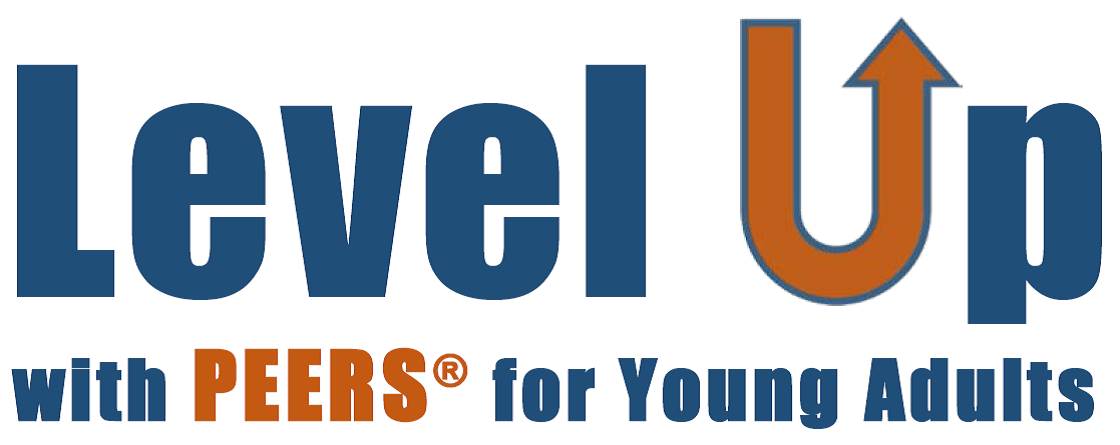Level Up with PEERS® is a program for Appalachian State University students who have difficulty with social communication and interaction, e.g., making and keeping friends, participating in conversation, handling disagreements, etc. This program includes weekly group and individual sessions to systematically teach and practice skills using the PEERS® Young Adult curriculum.
About the Program
Level Up uses the Program for the Education and Enrichment of Relational Skills (PEERS®) Young Adult curriculum to support participants in group and individual sessions. You can learn more about PEERS® here.
During each group meeting, facilitators introduce a specific topic, provide multiple different examples using video clips and demonstration, and provide opportunities for participants to practice through role-play and discussion. Individual sessions are offered to participants between sessions to practice and individualize instructional content.
Topics include:
- Making and keeping friends
- Starting and maintaining conversations
- Entering and exiting group conversations
- Appropriate use of humor
- Electronic communication
- Skills related to dating/relationships
- Get-togethers
- Handling disagreements
Two overarching concepts, social thinking and self-determination, serve as a foundation to support social skill instruction in Level Up.
Social thinking, or the processing of social information (e.g., using and interpreting nonverbal signals, understanding others' point of view, etc.), is essential for success in relationships including those with classmates, professors, employers and others. The concept of social thinking is taught in Level Up through explicit instruction, group and individual activities, demonstrations, and video modeling.
Self-determination refers to how an individual controls his or her own life. In Level Up, explicit instruction is used to teach strategies to support self-determination through being proactive, establishing goals and maintaining effective habits related to achieving goals.

Facilitators
Emily Rose and Jennifer Van Gilder are speech-language pathologists who work in the Communication Disorders Clinics at Appalachian State University. They facilitate the Level Up along with speech-language pathology graduate student clinicians.
- Emily Rose, Ph.D., CCC-SLP is an assistant clinical professor in the Department of Rehabilitation Sciences at Appalachian State University. She has 10 years of experience working across the age-span with clients who have social-communication challenges in a variety of settings. Dr. Lakey is licensed as a speech-language pathologist in NC and is a certified PEERS® Young Adult provider. Her areas of expertise include autism spectrum disorders, early intervention and professional development.
- Jennifer P. Van Gilder, MA, CCC-SLP is a clinical educator and adjunct professor in the Department of Rehabilitation Sciences at Appalachian State University. Mrs. Van Gilder is licensed as a speech-language pathologist in NC and is a certified PEERS® Young Adult provider. She has 20 years of experience working with school-age children, adolescents, and adults who have language-learning disorders and social communication impairments.
FREQUENTLY ASKED QUESTIONS
Q: What is social communication?
A: Social communication refers to observable behaviors/ skills needed to use language to communicate and engage in conversation with others. It includes using language for a variety of purposes (e.g., to share information, ask questions, make comments, negotiate, clarify, etc.), engaging in conversation (e.g., starting and ending conversations, maintaining a topic of conversation, taking conversational turns), and using non-verbal communication skills (e.g., eye contact, facial expression, body language, gestures, etc.).
Q: What is social thinking?
A: Social thinking is the processing of social information (e.g., interpreting nonverbal signals, understanding others’ point of view, understanding implied meaning, etc.). It is an essential framework for success in social and academic relationships including those with classmates, professors, employers and others in the college environment. The concept of social cognition is taught in our group through explicit instruction, group and individual activities, demonstrations, and video modeling.
Q: How can I be sure if Level Up is right for me?
A: Level Up aims to support students with identified social-communication challenges (see definition of social communication above). This is an inclusive group; students need not have a diagnosis to participate. If you'd like to discuss if this group would be a good fit for you, contact Dr. Lakey directly at lakeyer@appstate.edu or click Contact Level Up.
Q: How can I find out more about Level Up?
A: The best way to learn more is to contact Dr. Lakey directly at lakeyer@appstate.edu or click Contact Level Up.